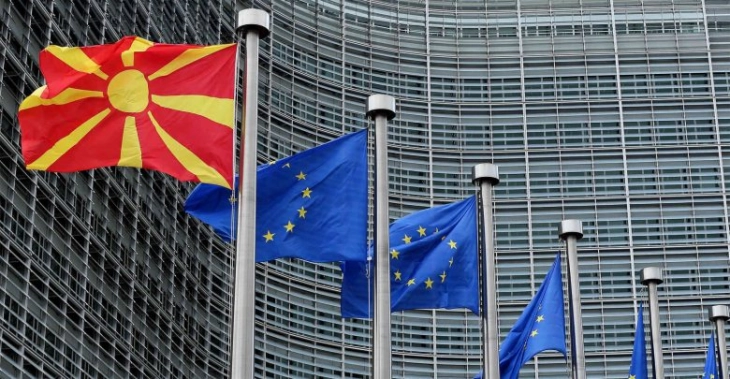EU: North Macedonia to gradually reduce primary deficit-to-GDP ratio to pre-crisis level

Brussels, 25 May 2022 (MIA) – The Council of the EU released Wednesday the joint conclusions of the Economic and Financial Dialogue between the EU and the Western Balkans and Turkey, MIA reports from Brussels.
On North Macedonia, the EU recommends that the country uses the available fiscal space in the 2022 budget to cushion the potential impact of adverse shocks through targeted support to vulnerable households and firms; foresee in the medium-term fiscal plan accompanying the 2023 budget a gradual reduction of the primary deficit-to-GDP ratio to its pre-crisis (2019) level.
The Union also wants to see a central public investment management unit set up in the Ministry of Finance and ensure its proper functioning.
“In line with the Tax System Reform Strategy, it urges the design of comprehensive tax reforms and draft legislative changes that contribute to enhancing revenue by broadening the tax base, and accelerate the digital transformation of the Public Revenue Office,” reads the recommendation.
The second recommendation is to submit the new public-private partnership (PPP) law to the Parliament for adoption and ensure its implementation, including by setting up a fully functioning PPP registry.
“Ensure central monitoring of all fiscal risks related to state-owned enterprises, PPPs, and Local Government Units by the Ministry of Finance. Implement the new organic Budget law as soon as it is passed by the Parliament and take the necessary legislative and organizational steps to enable the new Fiscal Council to take up operations,” it notes.
The EU also says price developments should be carefully assessed and analysed and the country should stand ready to tighten monetary policy, if needed, to preserve price stability in the medium term.
“Maintain a transparent and accurate reporting of asset quality and adequate provisioning, further reduce institutional and legal obstacles to swift and effective NPL resolution, all relevant institutions to continue to reduce data gaps in particular as regards the real estate sector and further implement measures to promote the role of the local currency. Safeguard the national bank’s independence in its key statutory tasks, including in staffing issues, in line with the law on the national bank, and to this end exclude the national bank from the scope of the new law on administrative servants and the law on public sector employees.,” reads the recommendation.
The EU urges the use the list of mapped para-fiscal charges to evaluate, optimise and rationalise para-fiscal charges at central and local levels.
“Continue the digitalisation of public services for businesses and citizens by upgrading and enhancing the use of e-portals for services. Adopt a comprehensive new strategy and Action Plan for formalisation of the informal economy 2023-2025 and ensure high level political commitment by all institutions relevant for the coordination and implementation,” it adds.
In addition, the EU recommends to Increase the number of staff and the technical/engineering capacity of the Energy Department in the Ministry of Economy and the Energy Agency.
“In line with the commitments of the Green Agenda for the Western Balkans: Adopt and implement energy efficiency legislation, including bylaws to the energy efficiency law. Following development and adoption of the legal and regulatory framework, establish the envisaged Energy Efficiency Fund,” it says.
Finally, the EU urges the development of new vocational education and training (VET) legislation with a focus on inclusion, labour market needs and a new methodology of financing VET as well as provide a yearly report for improving higher education, including recommendations for a new formula for the financing of higher education.
“Continue efforts to strengthen access to active labour market policies, particularly for low-skilled unemployed and people in vulnerable situations. Further increase the capacity of and cooperation between the employment agencies and centres for social work as well as education and training institutions to provide integrated services and measures for improvement of inclusion in the labour market,” reads the recommendation.







